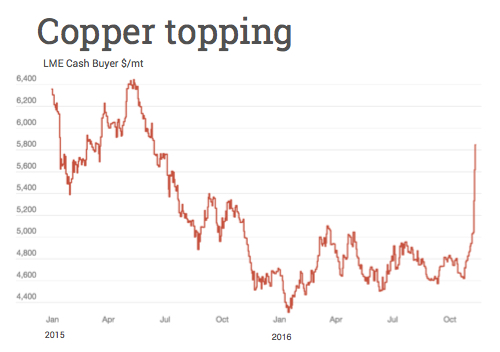Warnings as copper price surge continues
While gold's initial rally following Donald Trump's victory in the US presidential elections have evaporated, the rally in industrial metals continued on Friday with the copper price jumping to a 17-month high.
In pre-regular hours trade on Friday copper for delivery in December gained 4% from Thursday's close trading as high as $2.6525 per pound ($5,847 a tonne) in New York, the highest since mid-June 2015.
The current upturn in the copper price is vulnerable to a correction in investor sentiment or profit-takingCopper has risen during 14 of the last 15 trading sessions, adding 27% in the process. After underperforming other metals and steelmaking raw materials in 2016, copper is now firmly in bull market territory with a 24.5% rise year-to-date.

 This week's copper gains came on the back of hopes that Trump would succeed in pushing through a spending program of $500 billion when he takes office next year with the president elect promising as much as $1 trillion over ten years to rebuild roads, bridges, airports, hospitals and schools.
This week's copper gains came on the back of hopes that Trump would succeed in pushing through a spending program of $500 billion when he takes office next year with the president elect promising as much as $1 trillion over ten years to rebuild roads, bridges, airports, hospitals and schools.
In a research note Capital Economics cautions copper bulls that despite encouraging signs of falling warehouse stocks and the effect of recent production outages, the current upturn in the copper price is vulnerable to a correction in investor sentiment or profit-taking.
China represents half global demand for copper and the London-based economics research firm notes that its in-house proxy for China's copper demand - an index reflecting trends in the key industrial end-users of copper - has turned down in the third quarter:
This was largely driven by a slump in construction starts in September, which may have been the result of government efforts to take the heat out of the property market. Indeed, with little likelihood of additional stimulus, China's demand looks unlikely to revive significantly in coming months.
The US is not alone in turning to fiscal stimulus to boost economic growth as monetary policy becomes increasingly ineffective in jumpstarting lacklustre GDP growth in developed economies. Canada's Prime Minister Justin Trudeau announced a $125 billion infrastructure program shortly after taking office last year, while China is in the midst of a three-year $720 billion transport build-out program and the Asian country already spends more on infrastructure than Europe and the US combined.